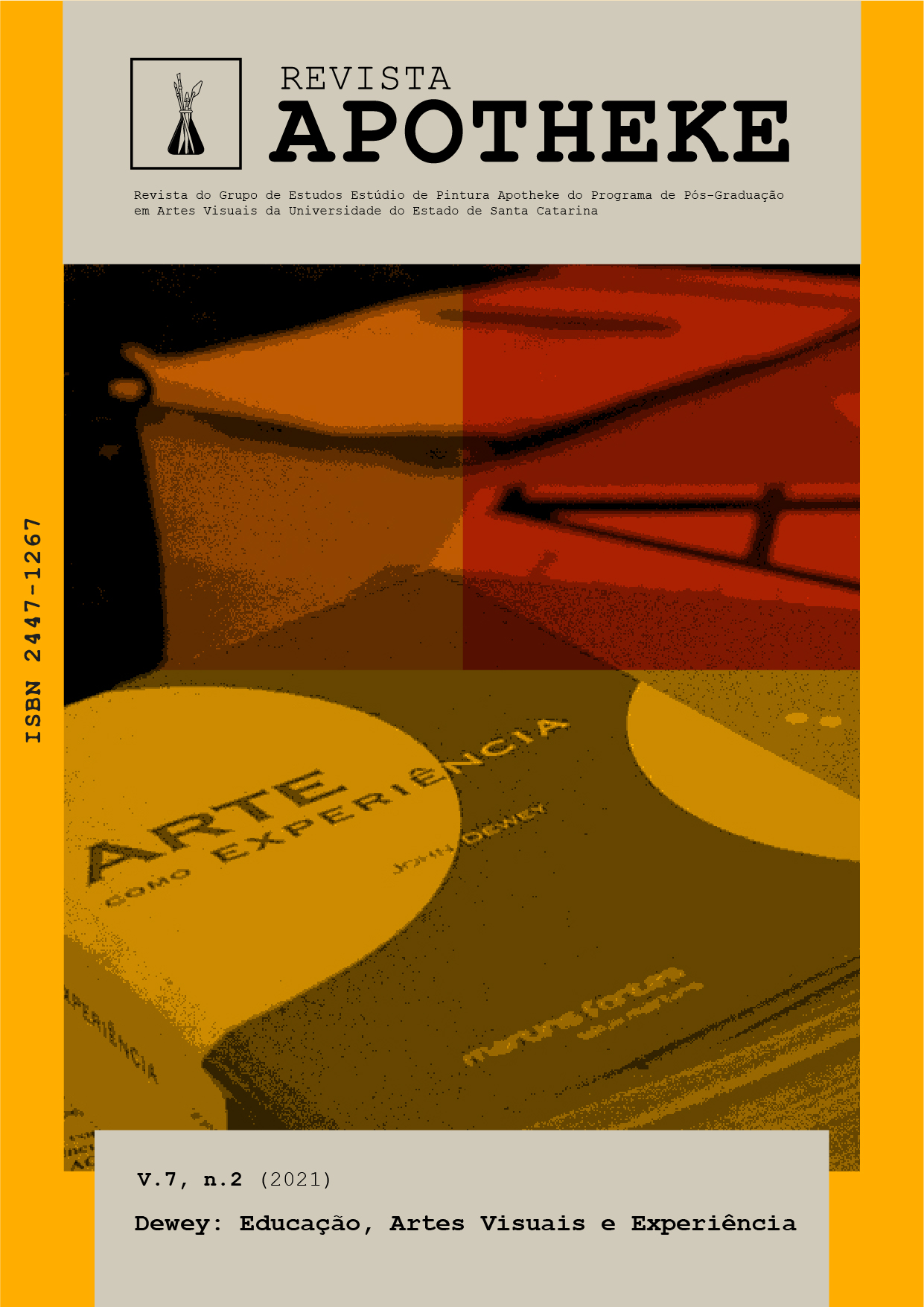The sketchbook as a resource to encourage the creative experience in Contemporary Art education
DOI:
https://doi.org/10.5965/24471267722021224Keywords:
Sketchbook, Processo-Criativo, Arte-Contemporânea, Poiética, Arte-educaçãoAbstract
The article seeks to problematize the use of the sketchbook as a didactic tool that helps and enhances the development of the creative process in art education, relating it to Contemporary Art. It also emphasizes the importance of stimulating creativity in students, an important skill, not only for teaching, but also for contemporary life, seeking to demystify some myths related to creation. To this end, we bring authors such as Charles Watson (2020), John Dewey (2010), Belidson Dias and Rita L. Irwin (2013), Icleia B. Cattani (2007), and others, in order to support and justify active methodologies based on practical experience of the learner, as well as creativity in art teaching. We present Brazilian and contemporary artists who use sketchbook as a means to stimulate creative thinking in their poetic process. Furthermore, we report particular experiences with our own sketchbooks and with the application of classes
Downloads
References
ALMEIDA, Cezar e BASSETTO, Roger. Sketchbooks. As páginas desconhecidas do processo
criativo. São Paulo: Ipsis, 2010.
ARQSC. O processo criativo por Charles Watson. 2014. (8m55s). Disponível em: https://
www.youtube.com/watch?v=S7JHBROYQMQ acesso em: 06 de junho de 2020.
BERLINER, Eduardo. Direto da FFWMAG 42: leia a entrevista exclusiva com o artista
Eduardo Berliner. [Entrevista concedida a] Waldick Jatobá. FFW, 10 nov. 2016. Disponivel
em: https://ffw.uol.com.br/lifestyle/cultura/direto-da-ffwmag-42-leia-entrevista-exclusivacom-
o-artista-eduardo-berliner/ Acesso em: 22 jun. 2020
BERLINER, Eduardo. Eduardo Berliner. In: ALMEIDA, Cezar e BASSETTO, Roger.Sketchbooks.
As páginas desconhecidas do processo criativo. São Paulo: Ipsis, 2010. p.90 - 99.
CANAL PHILOS. Como se manter criativo? Por Charles Watson I Philos TV. 2016. (3m21s).
Disponível em: https://www.youtube.com/watch?v=LSuoG8tATK0. Acesso em: 06 de junho
de 2020.
CANAL PHILOS. Dicas para ser criativo, por Charles Watson I Philos TV. 2017. (5m10s).
Disponível em: https://www.youtube.com/watch?v=86GHNtPWs38. Acesso em: 06 de junho
de 2020.
CATTANI, Icleia Borsa. (Org.) Mestiçagens: na Arte Contemporânea. Porto Alegre: Editora
da UFRGS, 2007.
CUNHA,Marcus Vinícius da. John Dewey: uma filosofia para educadores em sala de aula.
Petrópolis, RJ: Vozes, 2011.
DEWEY, John. Arte como Experiência. São Paulo: Martins Fontes, 2010.
DIAS, Belidson, IRWIN,Rita, L.(organizadores). Pesquisa educacional baseada em Arte:
a/r/tografia/. Ed. da UFSM. Santa Maria: Editoraufsm. 2013.
DIESEL, Aline. BALDEZ, Alda L. S. MARTINS, Silvana N. Os princípios das metodologias
ativas de ensino: uma abordagem teórica. Revista Thema, Lageado/ RS, V. 14 nº 1, 2017.
ERICKSON, Rebeca F. Sketchbook: possibilidades pedagógicas. 2015. Trabalho de conclusão
de curso II (Graduação em licenciatura em Artes Visuais) - Universidade Federal do Rio Grande
do Norte, Natal, 2015.
FIRJAN. Desempenho criativo Otimizado, com Charles Watson I Casa Firjan. 2019. (2h59m12s). Disponível em: https://www.youtube.com/watch?v=cnWEySnaF9Y Acesso em 07 de junho de 2020.
FIRJAN. Desempenho criativo Otimizado, com Charles Watson I Casa Firjan. 2019. (4m17s).
Disponível em: https://www.youtube.com/watch?v=8ILbmv1e_kk. Acesso em 07 de junho de
PREMIO PIPA. Bruno Kurru. Disponível em:https://www.premiopipa.com/pag/brunokurru/. Acesso em: 22 jun. 2020.
KEHRWALD, Isabel Petry. Música Educação Semiótica Literatura Artes Visuais Artes Cênicas.
Revista da FUNDARTE, Montenegro, v. II, n.4, p.48, Jul/Dez 2002).
KURRU, Bruno. Bruno Kurru. In: ALMEIDA, Cezar e BASSETTO, Roger.Sketchbooks As páginas
desconhecidas do processo criativo. São Paulo: Ipsis, 2010. p.60 - 69.
MATRIOSKAFILMES. Outros goles, o mesmo chá. 2013. (5m54s). Disponível em: https://
www.youtube.com/watch?v=lXtB2Cj0kJw#action=share
MATRIOSKAFILMES. Um chá com Charles. 2013. (06m18s). Disponível em: https://www.
youtube.com/watch?v=VtMRMSF2H_8#action=shareTVBRASIL.
TVBRASIL. Charles Watson - A arte pelo prisma da ciência. 2015. (26m20s). Disponível em:
https://www.youtube.com/watch?v=xIh5hRWlKJU&t=1s Acesso em: 06 de junho de 2020.
PASSERON, René. A poiética em questão. Revista Porto Alegre, Porto Alegre, N.2, V.1, Jul/
nov. 2004.
PREMIO PIPA. Eduardo Berliner. Disponivel em: https://www.premiopipa.com/pag/artistas/
eduardo-berliner/. Acesso em: 22 jun. 2020.
WATSON, Charles. Para o pesquisador Charles Watson, ensinar é um ato político. Disponível
em: <https://noticias.terra.com.br/educacao/para-o-educador-charles- watsonensinare-
um-ato-politico,f793f62541ac0410VgnVCM5000009ccceb0aRCRD.html> (Acesso em
/06/2020)
WATSON,Charles. Criatividade não tem nada a ver com dom. [Entrevista cedida a] Diego
Benevides. DIARIODONORDESTE. Fortaleza. v.2. n.3. Outubro 2016.
WATSON, Charles. Pedágio de pensamento. In: ALMEIDA, Cezar e BASSETTO, Roger.
Sketchbooks. As páginas desconhecidas do processo criativo. São Paulo: Ipsis, 2010.
ZAMBALA, Antoni. ARNAU. Laia. O termo competência surge como resposta às limitações
do ensino tradicional. In: ZAMBALA, Antoni. ARNAU. Laia. Como aprender e ensinar
competências. Porto Alegre: Artmed, 2010. p. 18 - 24.
ZIPPER GALERIA. Bruno Kurru. Disponível em:https://www.zippergaleria.com.br/pt/artistas/
bruno-kurru/. Acesso em: 22 jun. 2020.
Downloads
Published
How to Cite
Issue
Section
License
Copyright (c) 2021 Ricardo de Pellegrin, Ana Paula de Oliveira Cunico

This work is licensed under a Creative Commons Attribution-NonCommercial 4.0 International License.
Copyright and Licensing Policy
Authors of works submitted to Revista APOTHEKE authorize their publication in both print and digital formats exclusively for academic purposes. Reproduction is permitted, provided that the source is properly cited. Authors confirm the originality, authorship, and unpublished status of their manuscripts.
Articles published by the journal are freely available and intended for academic and non-commercial use only. All copyrights are transferred to the journal. The content of signed articles reflects the views of their respective authors and not the official position of Revista Apotheke. The author(s) agree to always cite the following reference when republishing or referring to the content originally published in Revista Apotheke:
“This article was originally published by Revista Apotheke in volume (insert volume), number (insert number), year (insert year), and is available at: http://www.revistas.udesc.br/index.php/APOTHEKE/index”
It is the sole responsibility of the authors to obtain written permission for the use of any material protected by copyright law included in their articles. Revista Apotheke is not responsible for copyright infringements committed by contributors.
Authors retain copyright and grant the journal the right of first publication, with the work licensed under a Creative Commons Attribution-NonCommercial License (CC BY-NC):
-
Attribution (BY): Licensees are allowed to copy, distribute, display, perform, and create derivative works, provided that proper credit is given to the author or licensor, in the manner specified.
-
NonCommercial (NC): Licensees may use the material only for non-commercial purposes.
After publication, authors retain the rights to their work and may republish the text.



